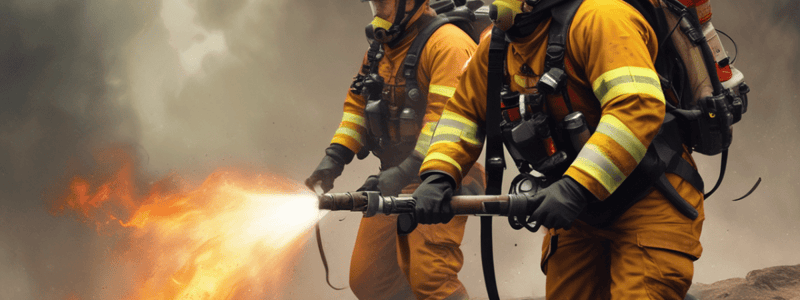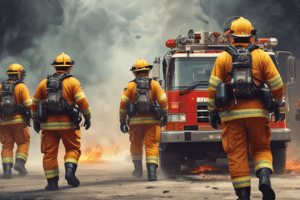Podcast
Questions and Answers
What is the primary responsibility of the first arriving Pump Class Apparatus?
What is the primary responsibility of the first arriving Pump Class Apparatus?
- Advance hose lines for extinguishment
- Position apparatus past the address involved
- Establish Command as per TN 104.3.7 (correct)
- Secure the surrounding area for exposures
What should the crew member do if the water supply cannot be secured?
What should the crew member do if the water supply cannot be secured?
- Abandon the scene
- Use an alternative water source
- Communicate via radio (correct)
- Call for additional resources
What is the purpose of positioning apparatus past the address involved?
What is the purpose of positioning apparatus past the address involved?
- To provide a vantage point for incident command
- To maintain space for an Aerial device (correct)
- To block the road
- To secure the surrounding area
What should the second arriving Pump Class Apparatus do upon arrival?
What should the second arriving Pump Class Apparatus do upon arrival?
What does the first arriving Pump Class Apparatus need to do if a Quint is the first arriving pump class apparatus and there is no other Aerial assigned?
What does the first arriving Pump Class Apparatus need to do if a Quint is the first arriving pump class apparatus and there is no other Aerial assigned?
What should the crew member do if the first hydrant or pump fails?
What should the crew member do if the first hydrant or pump fails?
What should be done before the second water supply is established?
What should be done before the second water supply is established?
What type of hydrant should be used as a second water supply if the initial apparatus is connected to a hydrant with less flow?
What type of hydrant should be used as a second water supply if the initial apparatus is connected to a hydrant with less flow?
When is relaying a pump to the first arriving pump class apparatus required?
When is relaying a pump to the first arriving pump class apparatus required?
What is the primary responsibility of the first arriving aerial/platform/quint?
What is the primary responsibility of the first arriving aerial/platform/quint?
What should be considered when specialty apparatus is on the scene but not being utilized?
What should be considered when specialty apparatus is on the scene but not being utilized?
What is the purpose of positioning specialty apparatus appropriately on the scene?
What is the purpose of positioning specialty apparatus appropriately on the scene?
What should be followed when operating on a scene?
What should be followed when operating on a scene?
What should be a consideration for the Incident Commander?
What should be a consideration for the Incident Commander?
Flashcards are hidden until you start studying
Study Notes
General Responsibilities
- This document does not apply to High Rise, Commercial, and Industrial occupancies.
First Arriving Pump Class Apparatus
- Establish Command as per TN 104.3.7
- Position apparatus past the address involved while maintaining space for an Aerial device
- Guarantee water supply by having a crew member catch a hydrant
- Communicate via radio if water supply cannot be secured
- Affect an immediate rescue
- Advance hose lines for rescue, exposures, fire confinement, and extinguishment
- If a Quint is the first arriving pump class apparatus, another Aerial shall be requested if there is not another one assigned on the initial dispatch
- Transfer Command, if appropriate, as per TN 104.1.6
Second Arriving Pump Class Apparatus
- Ensure Command is established as per TN 104.3.7 and TN 104.1.6
- Position apparatus by a second hydrant while maintaining space for an Aerial device
- Secure own water supply (in case first hydrant or pump fails)
- Second water supply should be a Class AA hydrant (blue rings on 65mm ports) if initial apparatus is connected to a hydrant with less flow (Class A, B, or C hydrant)
- May be required to relay pump to the first arriving pump class apparatus on a split lay when instructed by the IC (distance too great from hydrant to fire)
- Ensure the first in attack line is advancing to the seat of the fire (aid in advancing hose, removing kinks, door control)
- Stretch a backup line, unless otherwise dictated by the IC (second line)
First Arriving Aerial/Platform/Quint
- Position apparatus to access the structure for rescue, elevated master stream, and aerial device
- Provide a second means of firefighter egress with aerial device or ground ladders
- Perform forcible entry, search, and rescue, and ventilation
Responsibilities of Specialty Apparatus
- Ensure Command has been established as per TN 104.3.7
- Position apparatus appropriately to leave room for incoming apparatus and access to water supply
- Perform forcible entry, search and rescue, and ventilation
- Use specialty equipment
- Clear specialty apparatus from a scene if their equipment is not being utilized or their task can be taken over from another apparatus
Studying That Suits You
Use AI to generate personalized quizzes and flashcards to suit your learning preferences.


